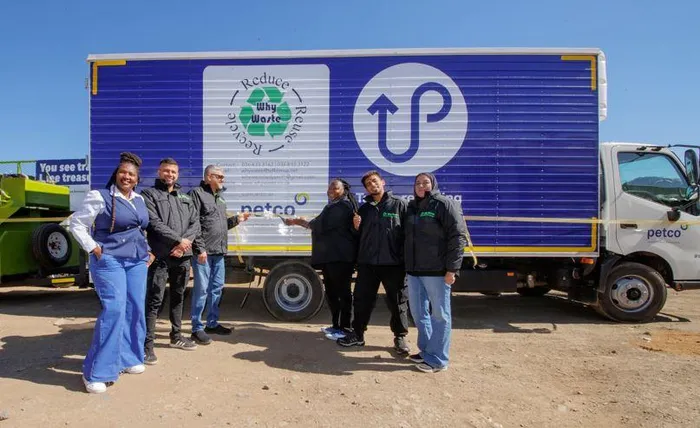
Keep on trucking: Why Waste CEO Aslam Patel (third from left) and Petco CEO Telly Chauke (third from right) cut the ribbon on the buy-back centre’s new truck. As a Petco Empowerment Fund grant recipient, Why Waste has been able to acquire the equipment it needs to drive collections in the Ladysmith area. Looking on are (from left) Petco’s Tlou Sebola, and Why Waste’s Fayaaz Patel, (second from right) Ismail Patel and Razia Patel.
Image: Supplied.
The Petco Empowerment Fund, funded by contributions from Petco’s producer members and other benefactors, provides accessible finance and support to B-BBEE Level 1 SMMEs to help them increase their operational capacity, thereby contributing to their increased ability to collect recyclable materials.
Petco CEO Telly Chauke said building a sustainable circular economy requires a vision that goes beyond capacitating players to remain where they are in the collection and recycling value chain, and instead empowers them to grow in scale and impact.
“We should be creating a pipeline of growth by providing support at all levels, from waste picker projects right up to emerging industrialists – to assist them to participate meaningfully in the value chain, and ensure a stronger, more inclusive recycling landscape in South Africa,” said Chauke.
“Our Petco Empowerment Fund is the result of streamlining and repositioning our development investment strategy to expand beyond our existing, day-to-day support for projects. It allows us to create upward mobility and scale up our developmental impact."
Chauke said a number of pre-qualifying SMMEs had already undergone Petco’s rigorous application and selection process, demonstrating their improved capacity, skills and economic viability.
One of the first grant recipients, Why Waste in Ladysmith, KwaZulu-Natal, is already creating a positive economic ripple effect in the surrounding communities through the buying and selling of post-consumer recyclable packaging.
The 100% black-owned business, which has been operating in the sector for almost 30 years, currently employs 59 community members and trades with a network of around 230 independent waste collectors, collecting over 6000 tonnes of recyclable materials annually.
Why Waste used the bulk of the R1.3 million grant funding to purchase capital equipment, recently taking delivery of a four-ton truck, double-axle trailer and mobile baling machine.
Speaking at the handover ceremony, Why Waste’s head of finance and marketing, Razia Patel, described the grant and equipment as “transformational”.
“Prior to this, our collections and baling processes were limited by logistics and manual handling constraints. With this new equipment, we are now able to process more recyclables, reduce transport costs, and improve turnaround times,” Patel said.
She said the equipment had already enabled Why Waste to extend its reach into under-served areas and increase collection frequencies.
“The mobile baler allows us to compact recyclables at source, reducing transportation bulk and enabling us to collect higher volumes more cost-effectively. With the additional truck and trailer, we have also been able to establish new collection routes, particularly in rural and semi-urban areas where packaging waste often goes uncollected. As a result, we’ve seen a significant increase in volumes collected.”
More importantly, Patel said, the grant had already had a direct and positive effect on the communities they serve.
“We’ve been able to onboard more local waste pickers by supplying them with bags and providing consistent buy-back support. Our operations now support more livelihoods through direct and indirect employment, including drivers, loaders, and baling staff.”
Additionally, she said, the increased throughput had allowed Why Waste to engage more local businesses and SMMEs in the recycling value chain, creating a more inclusive and sustainable ecosystem.
“The improved logistics and processing capability also mean we can offer more reliable services to schools, shopping centres, and community collection points, helping embed a culture of recycling in the areas we serve.”
It is Why Waste’s on-going community engagement efforts, particularly among local schools, that saw the business earn the 2023 Petco Award in the Environmental and Education Awareness Initiative category.
Petco’s general manager for recycling and collections, Samu Mkhize, said the company was selected for the grant based on its alignment with Petco’s core funding priorities of transformation, enterprise development, impact and growth potential, as well as sustainability and localisation.
Aside from the socio-economic benefits, Why Waste projects to grow its collection volumes by 20 to 25%, which will see an additional 1000 to 1500 tonnes of recyclable packaging kept out of the environment or landfill each year.
“Why Waste has demonstrated its commitment to inclusive employment practices, has a history of community empowerment as well as proven operational capacity, with high – and growing – recycling volumes that are stimulating the local green economy,” said Mkhize.
Patel added that it was gratifying to have their efforts acknowledged and supported.
“This support is deeply meaningful to us – not just as a boost in productivity, but as a vote of confidence in our mission to drive sustainable waste management in South Africa. It empowers us to grow responsibly while strengthening our ability to divert valuable materials from landfill.”
BUSINESS REPORT